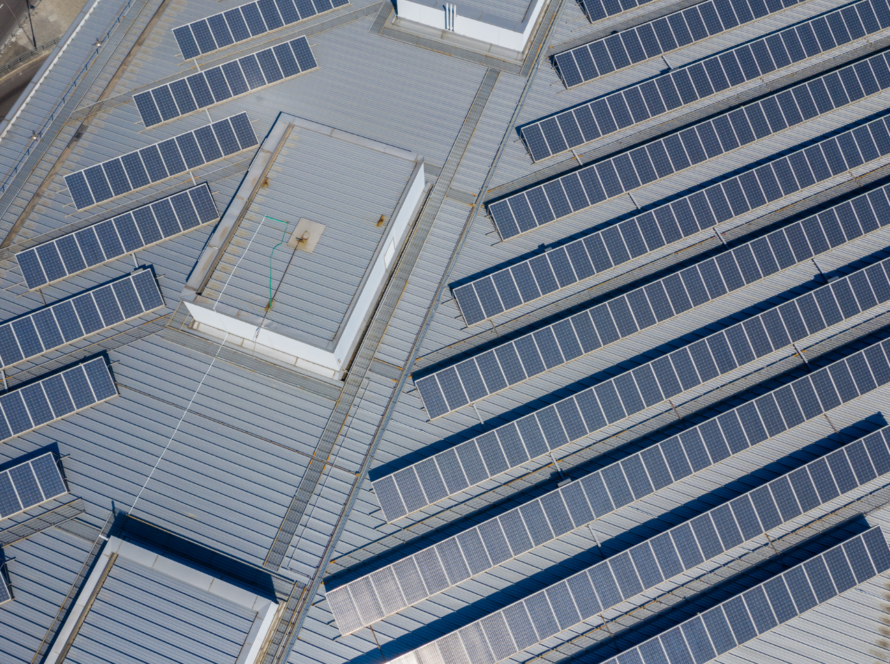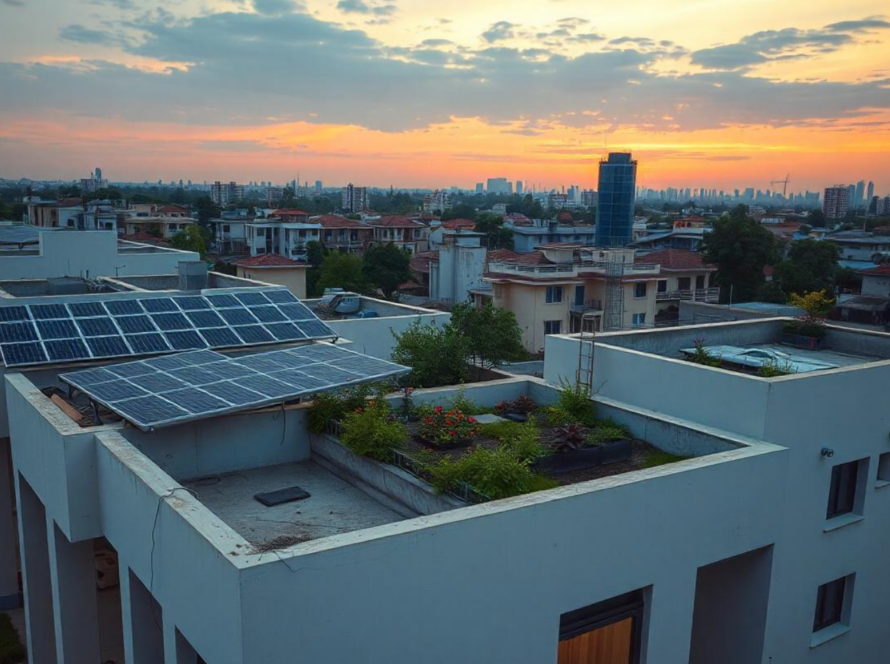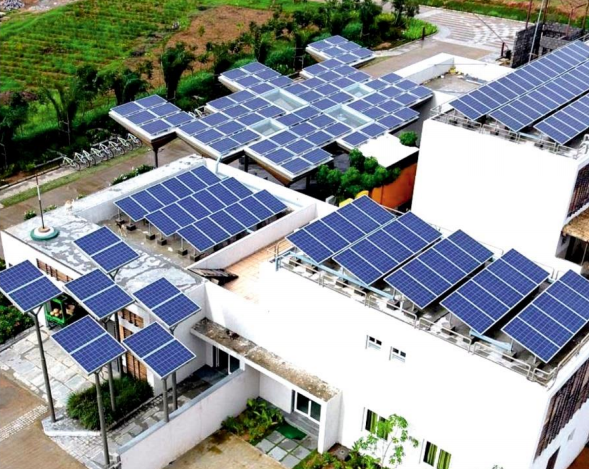Schedule a FREE consultation with us today!
Get genuine advice from our solar experts.
No pressure, book only if you are satisfied!
Reduce My Electricity Bill
We stand at the forefront of solar
CR Energy is a market leader in the solar sector, committed to bringing innovative and sustainable energy solutions to homes and businesses across Telangana. With the guidance of Shri P Krishna, Retd DE TGSPDCL, our journey has been driven by passion, innovation, and a steadfast commitment to creating a cleaner, greener future.
Residential Rooftops
Commercial Rooftops
Answering some common questions
CR Energy is one of the leading solar vendors in Telangana, registered under MNRE, Suryaghar Muft Bijili Yojana, TGREDCO, and TGSPDCL. Founded in 2021 by P. Krishna, a retired Division Engineer from TGSPDCL, the company benefits from his expertise alongside a dynamic team of entrepreneurs Athelli Tejasvi (Head of Sales Marketing and PR) and P. Anuragh (Head of Operations)
We specialize in designing and installing solar panel systems for residential properties, housing societies, and businesses, offering tailor-made, affordable, and efficient solutions.
At CR Energy, we are committed not only to reducing the carbon footprint but also to protecting the planet while aligning with our customers’ values and aspirations.
A solar rooftop system consists of solar panels and inverters. The solar panels, equipped with PV cells, convert sunlight into direct current (DC). The inverters then convert this DC into alternating current (AC), which can be used to power your home or business. The entire system is connected using AC and DC cables, AC combiner boxes, DC combiner boxes, earthing cables, and MC4 connectors, all mounted on a solar panel mounting structure. This setup ensures efficient energy conversion and safe operation of the solar system.
There are three types of solar systems, based on whether they are linked to the power grid or include battery storage:
- On-grid solar systems connect to the public electricity grid. Excess solar power is exported, and users often receive feed-in tariffs or credits under the Net-Metering Policy, available in most Indian states.
- Off-grid solar systems are independent of the grid and require battery storage. They must be designed to generate sufficient power year-round, even in low-sunlight seasons like winter.
- Hybrid solar systems combine solar power with battery storage, allowing energy to be stored during the day for use at night. The grid serves as backup when battery storage is depleted, offering the best of both worlds.
If you want to save money while harnessing the power of the sun, solar energy is the best investment for you. Solar systems not only help reduce your monthly electricity bills but also contribute to a greener planet. As a true form of renewable, clean energy, solar power generates zero pollution—air, noise, or land—and emits no greenhouse gases, effectively mitigating climate change.
Yes, the electricity produced by a solar power system is identical to the electricity provided by your utility company, with the only difference being its source. Moreover, solar energy is one of the safest forms of electricity consumption, as it is non-hazardous and produces no toxic or harmful gases during production.
To qualify for a solar system, all you need is available space on your roof and access to it. Simply fill out the project enquiry form on our website, and our team will get in touch with you to discuss your requirements. Once the project is finalized, we will handle the complete design, installation, and maintenance of your solar plant.
Yes, solar panels do generate electricity in cloudy or rainy weather, though with reduced efficiency. This decrease in production is accounted for in the unit generation estimates provided for each project.
No, rooftop solar PV systems do not function or generate electricity during a blackout due to safety reasons. Since blackouts occur when the electricity grid is compromised, if a solar inverter continued to feed electricity into the damaged grid, it could pose a risk to the safety of repair personnel working on the network.
The production level of a solar plant depends on several factors, including radiation levels, sunlight exposure, plant design, and the quality of components. On average, a 1 kW solar plant generates about 4 to 4.5 units of electricity per day.
- What kind of appliances can I use on solar power?
Solar power plants are used to power heavy machinery in industrial plants as well as household electrical and electronic appliances. Since the electricity generated is synchronized with your grid or diesel generator, there are no voltage fluctuations, regardless of the number of appliances in use.
- How do I decide what size of plant I need?
The size of your solar plant depends on the following factors:
- Your electricity consumption pattern
- Available shadow-free area
- Solar irradiation in your area
Once you express interest in a solar project, CR Energy conducts a detailed mapping to determine the optimal project size for your needs.
- What is net metering?
Net metering is a billing system that allows consumers to use the electricity they generate at any time, not just when it’s produced. It’s ideal for renewable energy sources like solar and wind, which are non-dispatchable.
Here’s how net metering works:
- Excess power: When solar panels generate more electricity than a home uses, the excess is sent to the grid.
- Credits: The home’s electricity meter runs backward, crediting the homeowner for the excess power sent to the grid.
- Net energy use: The homeowner is only billed for the “net” energy used, which is the difference between consumption and generation.
- Using credits: Homeowners can use accumulated credits to offset electricity usage when their panels can’t generate enough power, such as at night.
Under the Surya Ghar Muft Bijili Yojana, the subsidy application process has been simplified. Here’s a step-by-step breakdown:
- Visit the official website: pmsuryaghar.gov.in(National Portal for Rooftop Solar).
- Register as a consumer on the website to apply for a rooftop solar system.
- Once registered, log in, provide basic details such as USC, and upload a copy of your current electricity bill. A feasibility report will be generated automatically.
- After reviewing the feasibility and applying for load enhancement (if required), select CR Energy as your solar installation company/vendor.
- Discuss the project details with us and sign the agreement.
- Upon receiving payment, we will begin the installation process.
- Once the installation is complete, we will provide a work completion report and apply for net meter installation on your behalf.
- You will receive a commissioning certificate upon completion of the installation.
- Submit your bank account details and upload a copy of a cancelled cheque through the National Portal for Rooftop Solar.
- Once the fund handling agency receives your details, the subsidy will be credited to your bank account within 30 days.
By following these steps, you can easily complete the process and start enjoying the benefits of solar energy.
The lifespan of a solar rooftop system is typically 25 years. The main components include solar panels, which come with a warranty of 25-30 years, and inverters, which have a warranty ranging from 5 to 12 years.
A solar rooftop system has minimal moving parts, resulting in very low maintenance costs.
It is recommended to clean solar panels 1-2 times a month. For safety, clean them early in the morning or at night when there is no direct sunlight, and the system is not generating electricity. Use a clean, wet cloth, soft nylon brush, or sponge to wipe the surface, ensuring the panels are dry afterward. Avoid using metal brushes or detergents, as they may damage the glass or leave streaks.
Rooftop solar projects are highly lucrative investments for industrial, commercial, and residential properties. With a breakeven point typically achieved in 2-4 years, you can enjoy substantial savings over the 25-year lifespan of the system
If you are considering installing solar panels for your home or housing societies, the following price list can serve as a useful reference for the cost of rooftop solar systems in India, excluding any subsidies:
- 1 kW rooftop solar system: ₹70,000 to ₹1,10,000
- 2 kW rooftop solar system: ₹1,40,000 to ₹1,80,000
- 3 kW rooftop solar system: ₹1,80,000 to ₹2,40,000
- 4 kW rooftop solar system: ₹2,40,000 to ₹3,20,000
- 5 kW rooftop solar system: ₹3,00,000 to ₹4,00,000
- 10 kW rooftop solar system: ₹6,00,000 to ₹8,00,000
These prices are estimates and may vary based on the quality of equipment and the specifics of installation.
What clients say
“A+ service! The team was knowledgeable, and the panels are performing beyond expectations.”
P Sunitha
“Going solar was the smartest choice. We love reducing our carbon footprint and saving money!”
T Lalitha
“Eco-friendly and cost-effective! The CR Energy team made going solar easy and stress-free.”
T Lingaiah
“Great service from start to finish. The panels work perfectly, and we’re already seeing a return on investment!”
Jagga Reddy
“Switching to solar was the best decision! The installation was smooth, and the savings are real.”
G Kiran
“The team was professional, efficient, and knowledgeable. Loving our clean energy setup!”
Ch Satyanarayana
“Seamless installation and instant savings! Our energy bills dropped immediately. Highly recommend!”





